試す 金 - 無料
Art By Design
Artists & Illustrators
|Summer 2018
His design and architecture is iconic but JENNY WHITE reveals how CHARLES RENNIE MACKINTOSH embraced painting throughout his dazzling career
-

Fluid, natural forms fused with bold geometric lines; the tightly coiled Glasgow rose; the exclamatory uprights of furniture which even now seem strangely futuristic: as an architect, designer and pioneer of Art Nouveau, Charles Rennie Mackintosh needs little introduction. The Glasgow-born visionary’s influence can be seen in his city’s most arresting buildings, but also in public and private collections far beyond the busy industrial city where he lived for much of his life.
A new exhibition at Glasgow’s Kelvingrove Art Gallery and Museum, Charles Rennie Mackintosh – Making the Glasgow Style, places his work in context, providing a timeline that reveals his development, influences and, ultimately, his groundbreaking individuality. As curator Alison Brown puts it: “He tapped into the zeitgeist and created something utterly unique; his first high-back chair, for instance, which he designed for Miss Cranston’s Tearooms in Glasgow in 1898, is still used as the basis for designs in modern sci-fi and fantasy films today. His mind created something that was so ahead of its time, it’s still viewed as a way of representing the future.”

MAKING A MOVEMENT
このストーリーは、Artists & Illustrators の Summer 2018 版からのものです。
Magzter GOLD を購読すると、厳選された何千ものプレミアム記事や、10,000 以上の雑誌や新聞にアクセスできます。
すでに購読者ですか? サインイン
Artists & Illustrators からのその他のストーリー

Artists & Illustrators
Still life IN 3 HOURS
Former BP Portrait Award runner-up FELICIA FORTE guides you through a simple, structured approach to painting alla prima that tackles dark, average and light colours in turn
5 mins
March 2022
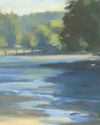
Artists & Illustrators
Movement in composition
Through an analysis of three masterworks, landscape painter and noted author MITCHELL ALBALA shows how you can animate landscape composition with movement
6 mins
March 2022
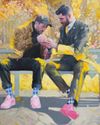
Artists & Illustrators
Shane Berkery
The Irish-Japanese artist talks to REBECCA BRADBURY about the innovative concepts and original colour combinations he brings to his figurative oil paintings from his Dublin garden studio
7 mins
March 2022

Artists & Illustrators
The Working Artist
Something old, something new... Our columnist LAURA BOSWELL has expert advice for balancing fresh ideas with completing half-finished work
2 mins
March 2022
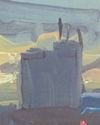
Artists & Illustrators
Washes AND GLAZES
Art Academy’s ROB PEPPER introduces an in-depth guide to incorporating various techniques into your next masterpiece. Artwork by STAN MILLER, CHRIS ROBINSON and MICHELE ILLING
7 mins
March 2022

Artists & Illustrators
Hands
LAURA SMITH continues her new four-part series, which encourages you to draw elements of old master paintings, and this month’s focus is on capturing hands
7 mins
March 2022

Artists & Illustrators
Vincent van Gogh
To celebrate The Courtauld’s forthcoming landmark display of the troubled Dutch master’s self-portraits, STEVE PILL looks at the stories behind 10 of the most dramatic works on display
6 mins
March 2022
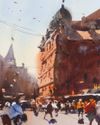
Artists & Illustrators
BRING THE drama
Join international watercolour maestro ALVARO CASTAGNET in London’s West End to paint a dramatic street scene
7 mins
March 2022
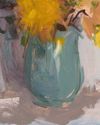
Artists & Illustrators
Serena Rowe
The Scottish painter tells STEVE PILL why time is precious, why emotional responses to colour are useful, and how she finds focus every day with the help of her studio wall
8 mins
March 2022

Artists & Illustrators
Bill Jacklin
Chatting over Zoom as he recovers from appendicitis, the Royal Academician tells STEVE PILL about classic scrapes in New York and his recent experiments with illustration
8 mins
March 2022
Translate
Change font size
